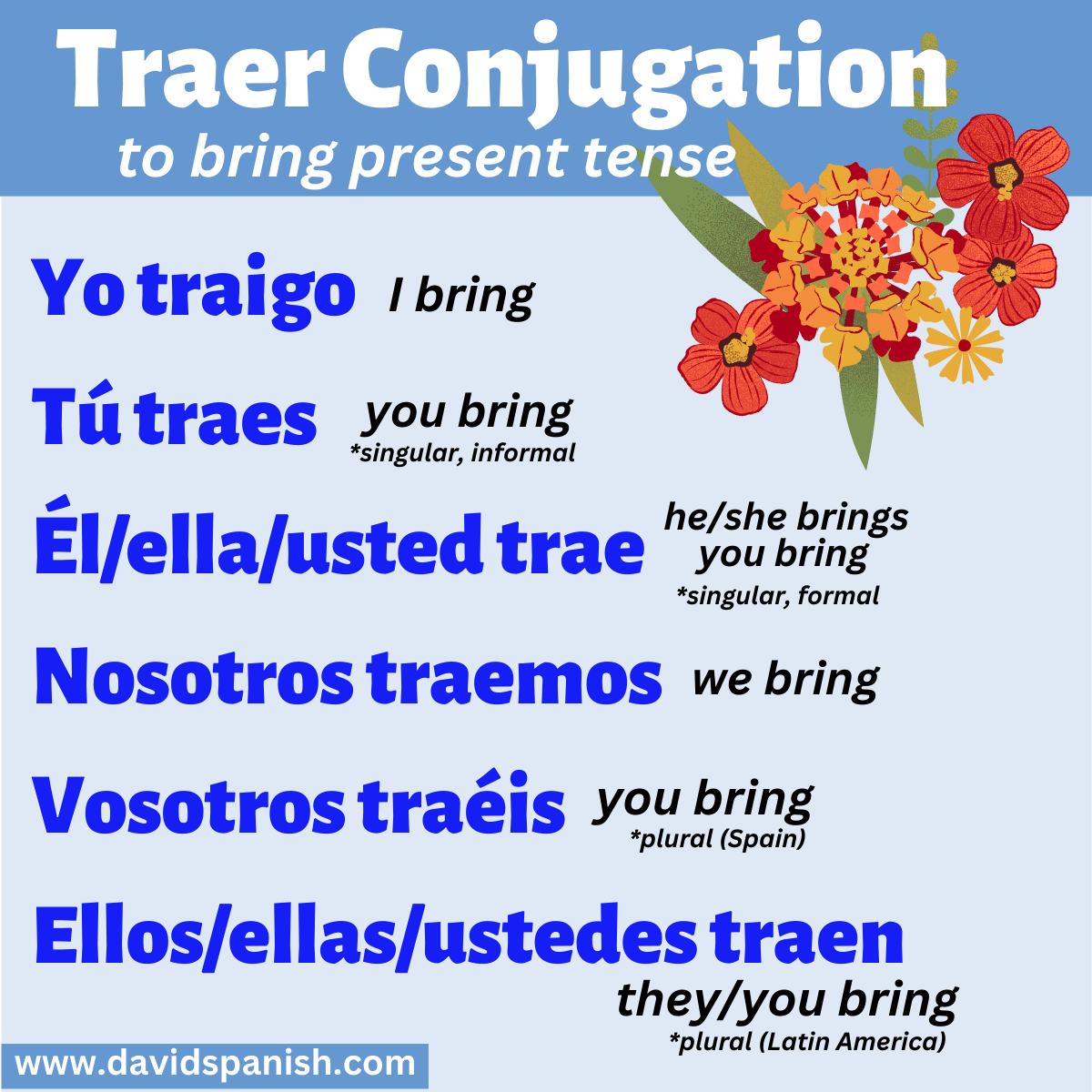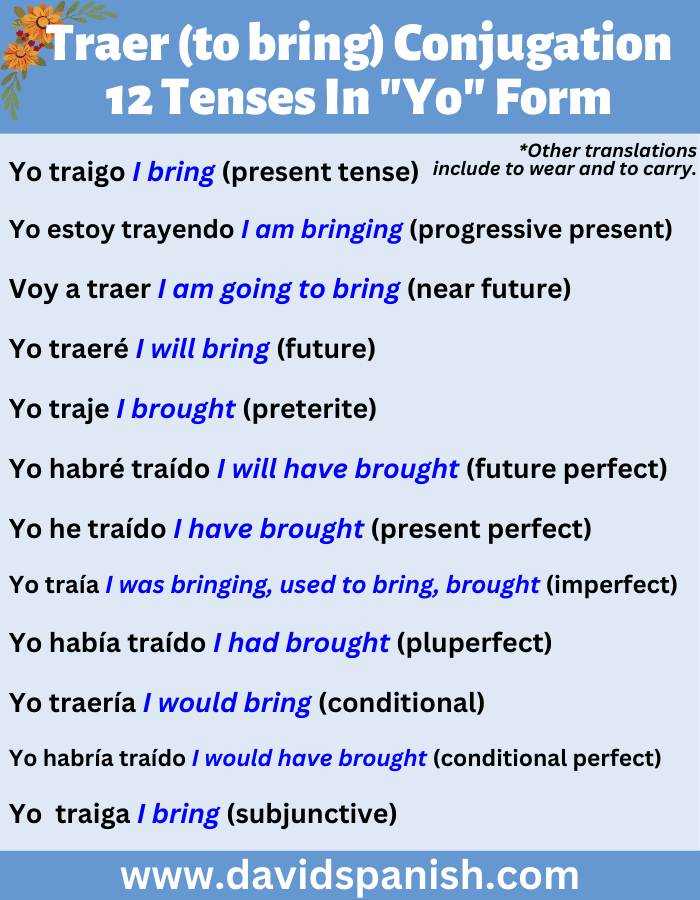Traer means to bring, to wear and to carry in Spanish. The conjugation of traer in the present tense is: Yo traigo (I bring), tú traes (you bring), él/ella/usted trae (he/she brings, you bring), nosotros traemos (we bring), vosotros traéis (you bring) and ellos/ellas/ustedes traen (they/you bring).

Traer is an irregular ER verb. This is because its stem changes in the first-person singular (yo) from when conjugated in the present tense. This page on our website covers regular and irregular Spanish ER verbs in detail.
Conjugation of traer in the present tense

Further down the page we provide conjugation charts with example sentences for traer in the following commonly used Spanish verb tenses.
- Present tense (presente de indicativo)
- Progressive present (presente progresivo)
- Near future (futuro inmediato)
- Future tense (futuro)
- Preterite (pretérito)
- Present perfect indicative (perfecto de indicativo)
- Imperfect (imperfecto de indicativo)
- Conditional (potential simple)
- Present subjunctive (presente de subjuntivo)
- Imperative (imperativo)
Traer conjugation table

The following graphic shows conjugations for traer in the first-person singular (yo) from in twelve verb tenses.

Traer conjugation charts
Present tense (presente de indicativo)
In the present tense, yo traigo translates to “I bring” and “I am bringing”.
| yo traigo | I bring | Traigo el poste. | I bring the desert. |
| tú traes | you bring | ¿Traes algo a al fiesta? | Are you bringing something to the part. |
| él/ella, usted trae | he/she brings, you bring | Él no puede leer porque no trae sus lentes para leer. | He can't read because he's not wearing his reading glasses. |
| nosotros traemos | we bring | Traemos los totopos a la cena. | We're bringing the tortilla chips to the meal. |
| vosotros traéis | you bring | Vosotros traéis las aceituna. | You are bringing the olives. |
| ellos/ellas, ustedes traen | they/you bring | No traen nada porque la tienda ha sido cerrada. | They're not bringing anything because the store has been closed. |
Progressive present (presente progresivo)
The progressive present is formed by combining the present tense of estar (to be) with the present participle. Yo estoy trayendo translates to “I am bringing”.
| yo estoy trayendo | I am bringing | Estoy trayendo las camarónes. | I'm bringing the shrimp. |
| tú estás trayendo | you are bringing | ¿Qué estás trayendo, compardre? | What are you bringing, buddy? |
| él/ella/usted está trayendo | he/she is (you are) bringing | Él está trayendo todos los ingredientes. | He's bringing all the ingredients. |
| nosotros estamos trayendo | we are bringing | Estamos trayendo la pizza. | We're bringing the pizza. |
| vosotros estáis trayendo | you are bringing | Estáis trayendo los refrescos. | You're bringing the soft drinks. |
| ellos/ellas, ustedes están trayendo | they/you are bringing | Están trayendo el helado. | They're bringing the ice cream. |
Near future (futuro inmediato)
The near future is formed by combining the present tense of ir (to go) with the preposition a and an infinitive. Yo voy a traer translates to “I am going to bring”.
| yo voy a traer | I am going to bring | Voy a traer la ensalada. | I'm going to bring the salad. |
| tú vas a traer | you are going to bring | Vas a traer la ensalada de papa. | You're going to bring the potato salad. |
| él/ella, usted va a traer | he/she is (you are) going to bring | No va a traer nada. | He isn't going to bring anything. |
| nosotros vamos a traer | we are going to bring | Vamos a traer el flan. | We're gong to bring the flan. |
| vosotros vais a traer | you are going to bring | Vais a traer el pastel. | You're going to bring the pie. |
| ellos/ellas, ustedes van a traer | they/you are going to bring | Van a traer los cubiertos. | They're going to bring the utensils. |
Future tense (futuro)
In the future tense, Yo traeré translates to “I will bring”.
| yo traeré | I will bring | Yo traeré a mi perro al parque. | I'll bring my dog to the park. |
| tú traerás | you will bring | Tú traerás tus zapatos nuevos. | You'll wear your new shoes. |
| él/ella, usted traerá | he/she/you will bring | Ella traerá el plato principal. | She'll bring the main dish. |
| nosotros traeremos | we will bring | Traeremos una entrada. | We'll bring an appetizer. |
| vosotros traeréis | you will bring | ¿Qué traeréis a la fiesta? | What will you bring to the party? |
| ellos/ellas, ustedes traerán | they/you will bring | Traerán los regalos por los niños. | They'll bring the gifts for the kids. |
Preterite (pretérito)
The preterite tense is used to express past actions which occurred at a specified time. Yo traje translates to “I brought”.
| yo traje | I brought | Traje el jugo de uva. | I brought the grape juice. |
| tú trajiste | you brought | Trajiste el salmón marroquí. | You brought the Moroccan salmon. |
| él/ella, usted trajo | he/she/you brought | Usted trajo las galletas con chispas de chocolate. | You brought the chocolate chip cookies. |
| nosotros trajimos | we brought | Trajimos el ron et la tequilla. | We brought the rum and tequilla. |
| vosotros trajisteis | you brought | Vosotros trajisteis las entradas. | You brought the appertizers. |
| ellos/ellas, ustedes trajeron | they/you brougt | Ellos no trajeron nada. | They didn't bring anything. |
Present perfect indicative (perfecto de indicativo)
The present perfect combines the present tense of haber (to have) with the past participle. Yo he traído translates to “I have brought”.
| yo he traído | I have brought | He traído los postres. | I've brought the deserts. |
| tú has traído | you have brought | ¿Has traído algo delicioso? | Have you brought anything delicious? |
| él/ella, usted ha traído | he/she/you have (has) brought | Ella ha traído el pastel. | She's brought the cake. |
| nosotros hemos traído | we have brought | Hemos traído las toallas de papel. | We've brought the paper towels. |
| vosotros habéis traído | you have brought | Habéis traído los productos de limpieza. | You've brought the cleaning supplies. |
| ellos/ellas, ustedes han traído | they/you have brought | Ellos han traído las bolsas de basura. | They've brought the garbage bags. |
Imperfect (imperfecto de indicativo)
The imperfect tense is used for expressing past actions which occurred at unspecified times. Yo traía translates to “I was bringing”, “I used to bring” and “I brought”.
| yo traía | I was bringing (or used to bring, brought) | Mi papá traía los champiñónes adobadoes. | My dad used to bring the marinated mushrooms. |
| tú traías | you were bringing | ¿Qué traías a las fiestas? | What did you used to bring to the parties? |
| él/ella, usted traía | he/she/you was (were) bringing | Ella traía un anillo de matrimonio. | She used to wear a wedding ring. |
| nosotros traíamos | we were bringing | Traíamos las sillas cuando no llamaste. | We were bringing the chairs when you called us. |
| vosotros traíais | you were bringing | Traíais las tapas españoles. | They used to bring the Spanish bar snacks. |
| ellos/ellas, ustedes traían | they were bringing | Ustedes traían los totopos y la salsa. | You used to bring the chips and dip. |
Conditional (potential simple)
The conditional tense is used to express hypothetical actions. Yo traería translates to “I would bring”.
| yo traería | I would bring (wear or carry) | Traería los regalos si hubiera una fiesta. | I'd bring the gifts if there were a party. |
| tú traerías | you would bring | Traerías la ensalada si fuera necesario. | You'd bring the salad if it were necessary. |
| él/ella, usted traería | he/she/you would bring | Traería los lentes si no pudiera ver las letras. | He'd wear glasses if he couldn't see the letters. |
| nosotros traeríamos | we would bring | Traeríamos a los niños si estuvieran en clases. | We'd bring the kids if they weren't in class. |
| vosotros traeríais | you would bring | Traeríais las entrades si vinieran a mi casa. | You'd bring the appetizers if you were coming to my house. |
| ellos/ellas, ustedes traerían | they would bring | Traerían los refrescos si la tienda estuviera abierta. | They'd bring the soft drinks if the store were open. |
Present subjunctive (presente de subjuntivo)
The subjunctive is used to express wishes, emotions and doubts. Yo traiga translates to “I bring.
| yo traiga | I bring (wear or carry) | Es necesario que traiga las bolsas de basura. | It's necessary that I bring the trash bags. |
| tú traigas | you bring | Queremos traigas una entrada a la fiesta. | We want you to bring an appetizer to the party. |
| él/ella, usted traiga | he/she brings, you bring | Quiero que traiga a su hermana. | I want you to bring your sister. |
| nosotros traigamos | we bring | Es importante que traigamos los libros. | It's important that we bring the books. |
| vosotros traigáis | you bring | No penasmos que traigáis a los niños. | We don't think you're bringing the kids. |
| ellos/ellas, ustedes traigan | they/you bring | Exijo que traigan algo a la velada. | I demand that you bring something to the evening event. |
Imperative (imperativo)
The imperative is used to give commands and make suggestions. We’ve included example sentences under the chart.
- ¡Trae la pizza! Bring the pizza!
- ¡Traigamos los refrescos! Let’s bring the soda!
- ¡No traiga a su perro! Don’t bring your dog!
- ¡No traigan a los niños! Don’t bring the kids!
Discover more:
- Hacer (to make, to do) conjugation charts
- Ser vs estar explained
- Venir (to come) conjugation charts
- Querer (to want, to love) conjugation charts
- La Bamba Meaning, Spanish Lyrics & English Translation - May 4, 2024
- Bésame Mucho Meaning, Spanish Lyrics & English Translation - May 3, 2024
- Querida – Lyrics, Meaning & Translation - May 2, 2024
